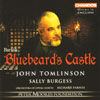Bartók Bluebeard's Castle
Moving and powerful, this English Bluebeard is as good as it gets
View record and artist detailsRecord and Artist Details
Composer or Director: Béla Bartók
Genre:
Opera
Label: Opera in English Series
Magazine Review Date: 7/2006
Media Format: CD or Download
Media Runtime: 63
Mastering:
Stereo
DDD
Catalogue Number: CHAN3133

Tracks:
| Composition | Artist Credit |
|---|---|
| Duke Bluebeard's Castle |
Béla Bartók, Composer
Béla Bartók, Composer John Tomlinson, Duke Bluebeard, Baritone Opera North Orchestra Richard Farnes, Conductor Sally Burgess, Judith, Mezzo soprano |
Author: Rob Cowan
Something of a nostalgia trip, this – returning to an English-language Bluebeard’s Castle. Many years ago I’d regularly engage with Jerome Hines, Rosalind Elias and Eugene Ormandy whose compelling Philadelphia Bluebeard, also in English, could do with a digital wash-and-brush-up. Not that I’m in any way using Ormandy as a yardstick to measure the excellent Richard Farnes, who has obviously thought long and hard about Bartók’s shattering score. The recording grew from performances by Opera North but the absence of a visual element hardly matters. And in this instance I don’t honestly think the language issue does, either.
Bluebeard is perfect food for the mind’s theatre, the tale of a man alone (as John Tomlinson reminds us in the cryptic spoken prologue) and while under normal circumstances I’d favour Hungarian above any translation, here vivid vocal acting and clarity of diction more than compensate. And there’s Farnes’s conducting, which even from as early as the introduction counters the pervading darkness with deftly pointed woodwind phrases and a light, expressive curve to the string lines.
Tomlinson’s Bluebeard is godlike, cautioning and doleful, the voice hugely resonant. Sally Burgess sounds old enough to know better than to stray thoughtlessly from her father’s home. When Judith first views the castle’s interior she sounds suitably tremulous and awestruck, though when she blurts out the words ‘tell me why the doors are bolted?’ an air of petulance spells trouble: her command to ‘open!’ cues forceful thwacks on timps and bass drum. And so the drama unfolds, Burgess’s Judith, shrewish and fatally curious, Tomlinson’s Bluebeard, inwardly tortured but fired by Judith’s dark beauty. The instruments of torture, the armaments, mountains of gold, tender flowers and spacious kingdom, all are graphically tone-painted, Farnes delivering with distinction every time – though when Burgess gasps at the kingdom newly revealed she keeps her high C fairly short. Tomlinson’s most sensitive moment, as so often with him in this work, comes when he recalls his former wives (track 19), and Farnes’s comes at the ‘lake of tears’, the perfect dovetailing of winds and strings, mournful but also extremely beautiful. The later climactic moments are delivered with enormous power, the sum effect very moving.
Comparisons? Ëotvös scores highest for a Hungarian-language Bluebeard, Haitink for Tomlinson in prime vocal condition, and Ferencsik in 1956 is both forceful and idiomatic. But for a thoroughly sympathetic, theatrically effective English-language Bluebeard’s Castle, this new release is about as good as it’s likely to get.
Bluebeard is perfect food for the mind’s theatre, the tale of a man alone (as John Tomlinson reminds us in the cryptic spoken prologue) and while under normal circumstances I’d favour Hungarian above any translation, here vivid vocal acting and clarity of diction more than compensate. And there’s Farnes’s conducting, which even from as early as the introduction counters the pervading darkness with deftly pointed woodwind phrases and a light, expressive curve to the string lines.
Tomlinson’s Bluebeard is godlike, cautioning and doleful, the voice hugely resonant. Sally Burgess sounds old enough to know better than to stray thoughtlessly from her father’s home. When Judith first views the castle’s interior she sounds suitably tremulous and awestruck, though when she blurts out the words ‘tell me why the doors are bolted?’ an air of petulance spells trouble: her command to ‘open!’ cues forceful thwacks on timps and bass drum. And so the drama unfolds, Burgess’s Judith, shrewish and fatally curious, Tomlinson’s Bluebeard, inwardly tortured but fired by Judith’s dark beauty. The instruments of torture, the armaments, mountains of gold, tender flowers and spacious kingdom, all are graphically tone-painted, Farnes delivering with distinction every time – though when Burgess gasps at the kingdom newly revealed she keeps her high C fairly short. Tomlinson’s most sensitive moment, as so often with him in this work, comes when he recalls his former wives (track 19), and Farnes’s comes at the ‘lake of tears’, the perfect dovetailing of winds and strings, mournful but also extremely beautiful. The later climactic moments are delivered with enormous power, the sum effect very moving.
Comparisons? Ëotvös scores highest for a Hungarian-language Bluebeard, Haitink for Tomlinson in prime vocal condition, and Ferencsik in 1956 is both forceful and idiomatic. But for a thoroughly sympathetic, theatrically effective English-language Bluebeard’s Castle, this new release is about as good as it’s likely to get.
Discover the world's largest classical music catalogue with Presto Music.

Gramophone Digital Club
- Digital Edition
- Digital Archive
- Reviews Database
- Full website access
From £8.75 / month
Subscribe
Gramophone Full Club
- Print Edition
- Digital Edition
- Digital Archive
- Reviews Database
- Full website access
From £11.00 / month
Subscribe
If you are a library, university or other organisation that would be interested in an institutional subscription to Gramophone please click here for further information.




